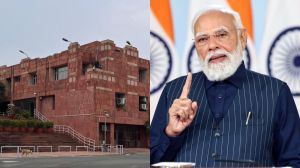Govt to slap 15 customs duty on milk powder
JUNE 11: The government will notify the imposition of 15 per cent basic customs duty on skimmed milk powder SMP and whole milk powder W...

JUNE 11: The government will notify the imposition of 15 per cent basic customs duty on skimmed milk powder SMP and whole milk powder WMP within a week under a new tariff rate quota regime, Agriculture Minister Nitish Kumar has said.
quot;All formalities regarding the notification of the import duty on SMP and WMP have been completed. The Finance Ministry will notify the new tariff in the next few days,quot; Kumar told PTI here yesterday.
Under the Tariff Rate Quota TRQ regime finalised by the government, India can clamp basic customs duty of 15 per cent on milk powder imports up to 10,000 tonnes per annum and 60 per cent on imports beyond this level. Presently, there is zero per cent import duty on milk powder and the Finance Bill for 2000-01 has provided for imposition of 60 per cent duty on both SMP and WMP.
The TRQ regime was evolved after successful bilateral negotiations with the exporting countries like the United States, European Union and other Principal Supplying Interests8217; under the WTO framework. quot;With the import duty being zero level, a total of about 17,000-18,000 tonnes of milk powder has already come into the country,quot; the Minister said.
The move to impose import duty on milk powder was to restrict inflow of cheap milk powder as it was adversely affecting the interest of Indian milk producers, Agriculture ministry sources said.
Though the TRQ regime was finalised late last year, its implementation was delayed due to the difficulties in identifying commodities on which India was to extend the duty concessions to countries which had agreed for the revised duty structure, sources said.
The Finance Ministry was also faced with difficulties in finalising a mechanism under which imports could be monitored at the ground level. According to the new mechanism, all importers would be required to register themselves with a single authority, either Director General of Foreign Trade DGFT or Agricultural Processed Food Export Development Authority APEDA, and undertake imports on a first-come-first-serve basis. With this, all imports up to 10,000 tonnes would attract the basic customs duty of 15 per cent and anything beyond this level, a duty of 60 per cent.
ATF prices to be deregulated
NEW DELHI: The government today said prices of Aviation Turbine Fuel ATF will be deregulated by the end of the current financial year. quot;Dismantling of the administered pricing mechanism would proceed as per schedule and the prices of aviation fuel would be deregulated, as scheduled, by end of the current financial year,quot; Petroleum Minister Ram Naik said addressing an interactive session on investment opportunities in petroleum sector in India in London.
The Government, as per the Cabinet decision in 1997, had decided to deregulate the imports and prices of ATF by the year 2000-01. The Government, therefore, recently increased the prices of ATF at the ex-storage point level by Rs 2.00 per litre while the retail selling price of the fuel was higher by Rs three.
ATF retail prices in Delhi presently cost Rs 17.19 per litre as against Rs 14.54 per litre before the price hike. Naik was replying to the queries raised by CEOs and senior executives of various multinational companies like Shell, Cairn Energy, BP Amoco, British Gas and ABN Amro, an official release here said.
Asked about the disinvestment of government equity in national oil companies, he said quot;specific disinvestment decisions would be taken shortly by the Government.quot;
Naik, who is on a week-long visit to Calgary to attend the World Petroleum Congress, said the system of exploration bidding had been streamlined and made more attractive with improved, internationally competitive fiscal terms under the New Exploration Licensing Policy NELP.
quot;Bidding in second round of NELP is likley during October/November this year and many new investment opportunities are available in India in the near future to investors,quot; he said.
Naik said in view of the huge requirement of gas in India, either pipeline or LNG projects would have to come up to satisfy the future demand. Indian refineries have added 43 million metric tonnes per annum MMTPA capacity during 1999-2000 raising the domestic capacity to 112.54 million metric tonnes per annum capacity, he said adding the capacity addition would go up by 51 MMTPA in the next few years.
- 01
- 02
- 03
- 04
- 05































